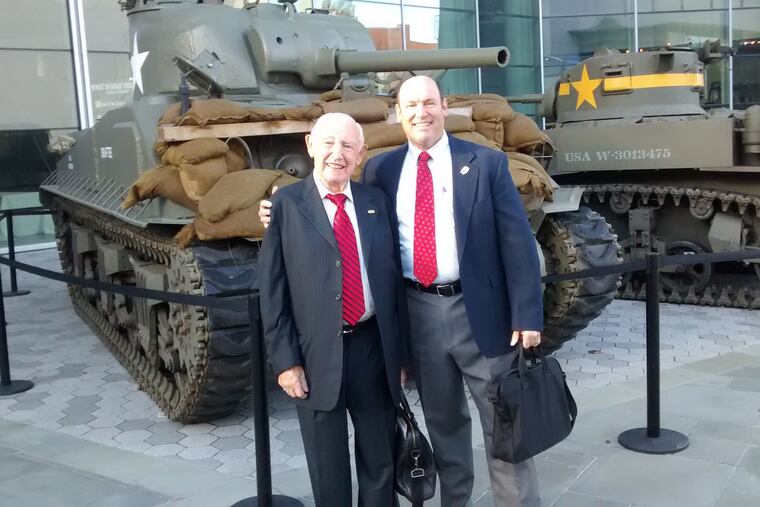New executive director of N.J. Holocaust Education Commission makes history as its first non-Jewish leader
Douglas Cervi, 69, hopes to increase awareness and expand how the Holocaust is taught in the state’s public schools as the new executive director of the New Jersey Commission on Holocaust Education.

Longtime South Jersey educator Douglas Cervi was teaching a lesson on the Holocaust when a student threw him a curveball: Did the World War II genocide of millions of Jews really happen?
Cervi was surprised to learn that several students in his social studies class at Oakcrest High in Mays Landing, Atlantic County, had that same, misinformed belief.
”I said, ‘Seriously?’” recalled Cervi.
It was a defining moment for Cervi during a career spanning more than four decades as a social studies teacher. He later took part in a four-week Holocaust training course and visited a Nazi concentration camp. He also is an adjunct professor of Holocaust and genocide studies at Stockton University. He retired from the Greater Egg Harbor Regional High School District in 2014.
”We still have people who say that this didn’t happen,” said Cervi, 69, of Mays Landing.
Now, Cervi hopes to increase awareness and expand how the Holocaust is taught in the state’s public schools as executive director of the New Jersey Commission on Holocaust Education. He is the third person and the first non-Jewish person to hold the position.
When asked what synagogue he belongs to, Cervi said he often responds, with a smile, “St. Nicholas Catholic Church.” He follows the advice he gives to students, to try to make the world better.
”There is only one race of human beings,” Cervi said.
New Jersey and Pennsylvania are among a dozen states requiring Holocaust and genocide education in public schools as well as discussions about bias, prejudice, bigotry, and bullying. New Jersey also requires schools to teach black history.
Cervi was appointed last month by outgoing state Education Commissioner Lamont Repollet. He replaced Larry Glaser, a longtime volunteer with the commission who became executive director in 2016. Glaser, of Moorestown, retired in May.
Commission member Maud Dahme, a Holocaust survivor who served on the nominating committee that selected Cervi, said she believes he will take the group in a new direction and ensure that schools teach about the Holocaust properly.
”We have to add new things,” said Dahme, 84, of Flemington, who came to the United States in 1950 at age 14. “One day there’s nobody going to be around who actually was there.”
» READ MORE: Cheltenham teacher is inspired by great-grandmother’s work rescuing Jews during Holocaust
Cervi often invites Holocaust survivors and death camp liberators to speak to his students to share their stories. He worries about a day when students are unable to hear first-person accounts.
It is estimated that there are 400,000 Holocaust survivors still alive worldwide. More than six million Jews were murdered by the Nazi regime, which believed that Germans were a “superior“ race.
”Fifty years from now, who’s going to teach this?” Cervi said.
His students have been captivated by war stories from David Wisnia, 93, of Levittown, who survived by singing to entertain his captors. Wisnia’s entire family was murdered at Auschwitz, the deadliest of the Nazi camps, where 1.1 million people were killed, 960,000 of them Jews.
”There are few people left who know the details,” Wisnia told the New York Times last year.
It is unclear how many of the state’s 600 districts have fully incorporated Holocaust and genocide instruction into lesson plans as required under a 1994 law. Repollet has said districts that fail to comply can lose points in their state evaluation.
Over the next year, Cervi plans to try to determine how districts are teaching the Holocaust and provide more resources on the commission’s website to help teachers develop and share lesson plans.
The commission also hopes to resume its annual trip for educators to Holocaust sites in Europe next year. The trip was canceled this year because of the pandemic.
A 2002 state law requires public schools to infuse African American history into K-12 social studies lessons. Starting in September, New Jersey schools must also include instruction about the contributions of lesbian, gay, bisexual, and transgender people.
Holocaust education has become more popular among some high school students, said Steve Marcus, coordinator of Stockton’s Holocaust and Genocide Dual Credit Consortium. About 500 students from 30 South Jersey schools and Abington High School in Montgomery County are taking dual-credit courses from Stockton, he said.
”This is a topic of phenomenal interest to kids,” Marcus said.
Cervi said the recent protests of the deaths of George Floyd and many others inspire him to advocate for teaching about the Holocaust to fight against injustices.
”I will fight this until I die. I just feel like I have an obligation,” he said.